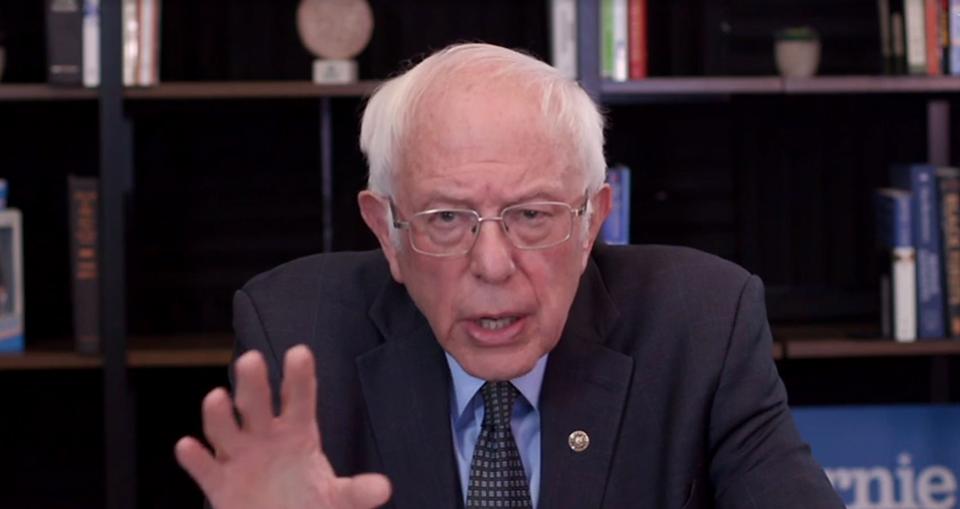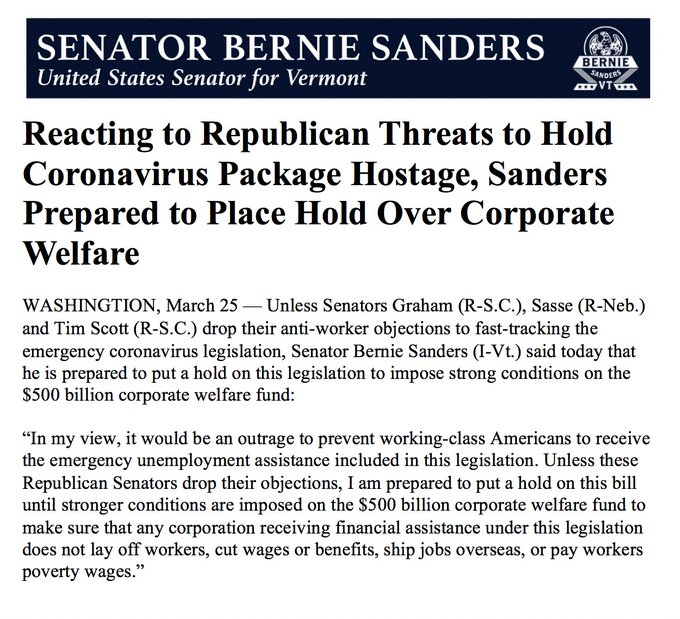
Presidential candidate Sen. Bernie Sanders
SANDERS CALLS BILL $500 BILLION CORPORATE WELFARE FUND, WANTS NO LAY-OFFS, WAGE CUTS, OUTSOURCING OF U.S. JOBS
REPUBLICAN SENATORS THREATEN UNEMPLOYMENT AID IN BILL
By Jordain Carney
March 25, 2020
A round of 11th-hour objections is throwing a curveball into the Senate’s consideration of a mammoth stimulus package.
Senate leadership announced the deal on the $2 trillion bill shortly after 1 a.m., and want to pass it on Wednesday as they face intense pressure to take steps to try to reassure an American public and an economy rattled by the coronavirus.
But a brewing fight over a deal on unemployment provisions is threatening to open the door to a push for broader changes to the bill, which was negotiated by Senate Majority Leader Mitch McConnell (R-Ky.), Minority Leader Charles Schumer (D-N.Y.) and Treasury Secretary Steven Mnuchin.
Sen. Bernie Sanders (I-Vt.), who is running for the Democratic presidential nomination, warned that unless a group of GOP senators back down from their demand for changes to the unemployment insurance benefits, he would slow walk the bill until stronger guardrails were put on hundreds of billions in funding for corporations.
“In my view, it would be an outrage to prevent working-class Americans to receive the emergency unemployment assistance included in this legislation,” Sanders said in a statement.
“Unless these Republican senators drop their objection, I am prepared to put a hold on this bill until stronger conditions are imposed on the $500 billion corporate welfare fund to make sure that any corporation receiving financial assistance under this legislation does not lay off workers, cut wages or benefits, ship jobs overseas or pay workers poverty wages,” Sanders continued.

Putting a “hold” on a bill would force McConnell to go through days of procedural loopholes that could delay the bill into the weekend or even early next week.
Sanders’s decision comes after Sens. Lindsey Graham (R-S.C.), Rick Scott (R-Fla.), Tim Scot (R-S.C.) and Ben Sasse (R-Neb.) raised concerns that the deal on unemployment benefits would “incentivize” individuals not to return to working.
The unemployment provision includes four months of bolstered unemployment benefits, including increasing the maximum unemployment benefit by $600.
But the GOP senators say that the agreement, which they are calling a “drafting error,” could prompt individuals who would make less working to leave their jobs, or not actively return to working.
“Unless this bill is fixed, there is a strong incentive for employees to be laid off instead of going to work. … We must sadly oppose the fast-tracking of this bill until this text is addressed, or the Department of Labor issues regulatory guidance that no American would earn more by not working than by working,” Graham, Sasse and Scott, of South Carolina, said in a joint statement.
The back-and-forth comes as senators are scrambling to learn the details of the mammoth package.
The World Health Organization declared a global emergency over the new coronavirus.
Graham said they learned the details of the deal during a 92-minute conference call Senate Republicans had on Wednesday morning. They are asking for a vote on an amendment that would cap unemployment benefits at 100 percent of a person’s salary.
Their demand sparked immediate bipartisan pushback.
Sen. Chris Murphy (D-Conn.) tweeted: “Let’s not over-complicate this. Several Republican Senators are holding up the bipartisan Coronavirus emergency bill because they think the bill is too good for laid off Americans.”
A Senate GOP aide pushed back against the four senators, underscoring the divisions within the caucus, saying that “nothing in this bill incentivizes businesses to lay off employees, in fact it’s just the opposite.”
“Each state has a different UI program, so the drafters opted for a temporary across-the-board UI boost of $600, which can deliver needed aid in a timely manner rather than burning time to create a different administrative regime for each state. … It’s also important to remember that nobody who voluntarily leaves an available job is eligible for UI,” the aide added.
- According to a CNN reporter, citing a source with knowledge of the dispute, the unemployment pay would be temporary and not intended to incentivize workers to leave a full-time job and its benefits.
- Stocks on the day jumped 5%, but with the news that the GOP senators and Sanders may delay a vote Wednesday, they fell back down, gains cut back to 500 points for the Dow Jones.
Key Background: Senate Majority Leader Mitch McConnell said he wanted to vote on the agreed bill Wednesday, but a dispute could delay it for days. If passed, the $2 trillion package would be the largest economic stimulus bill in U.S. history. According to the Washington Post, there are 60,115 confirmed coronavirus cases in the U.S. with 827 deaths.
REPUBLICANS HOLD UP STIMULUS BILL, OBJECT TO UNEMPLOYMENT PAYMENTS TO WORKERS
Forbes Staff
Breaking News Reporter

Senator Lindsey Graham R SC
Topline: The Senate’s economic stimulus bill stalled Wednesday after Republican senators claimed it would incentivize Americans not to return to work, potentially delaying a vote on relief for individuals and businesses.
Senators Lindsay Graham, R-S.C., Ben Sasse, R-Neb., and Tim Scott, R-S.C., at a joint press conference Wednesday, said the bill grants some workers $600 a week more in unemployment than their typical hourly wages.
“We have done the worst thing we could do to the economy, and have incentivized people to not go back to work,” said Graham, who called the disputed language a “drafting error.”
“We don’t want to do anything that would accelerate shortage in the supply chain and critical industries in America,” said Sasse, citing health aides and garbagemen as examples of workers whose wages would typically be lower than the bill’s enhanced unemployment benefits.
Changing the language, some are speculating, could divide the Senate and force a multi-day delay in a final vote on the bill.
According to a CNN reporter, citing an unnamed source with knowledge of the dispute, supporters of the bill say the unemployment pay is temporary, and would not incentivize workers to not have a fulltime job.
Key background: The three senators proposed adding an amendment to the bill to fix it, which they hoped to have done in a matter of hours. It further delays the bill’s passage, although Senate Majority Mitch McConnell said earlier on Wednesday they had hoped to vote that same day. Also on Wednesday: New York Gov. Andrew Cuomo criticized the bill, saying it didn’t allocate enough funds to provide relief to the state, the U.S. epicenter of the virus. But once the bill finally passes the Senate, the House will then have to vote in favor of it, before President Trump can sign it into law. Once enacted, it will be the largest economic stimulus bill in the nation’s history.
What to watch for: How the House decides to vote on the bill, because it is not in session. The Washington Post reported Tuesday that in order to make the bill law, the House could vote by what is called “unanimous consent,” which only requires two representatives present to vote in favor of the bill—but would need every senator to vote for the bill first, which would be highly unlikely. The House could also vote by proxy, according to the Post, which would allow representatives present on the floor to cast votes for missing members.




